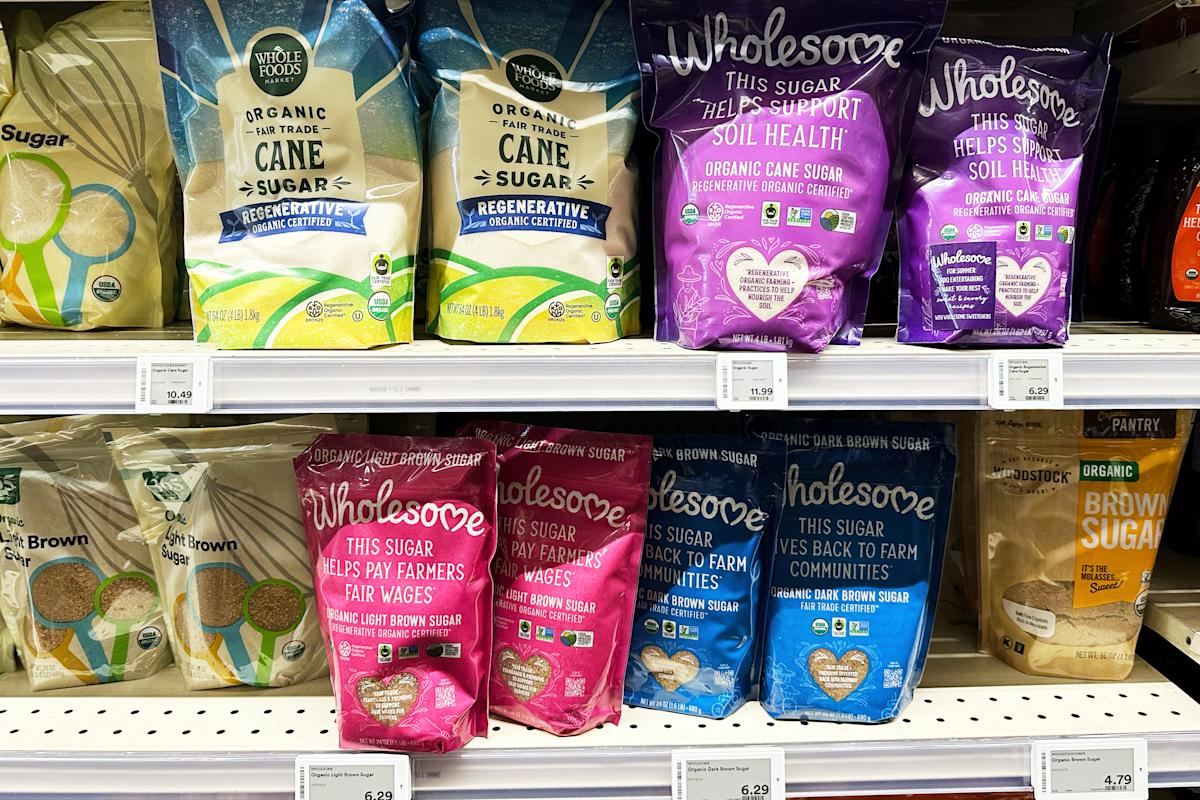SIOUX FALLS, S.D. (AP) — The price of most organic food could jump this fall due to new policies and tariffs on imported organic sugar, frustrating manufacturers who say the actions won’t help sugar growers but could put some food companies out of business.
More than 90% of organic sugar used by U.S. manufacturers is imported. The price of that product increased in August when the Trump administration imposed steep trade tariffs, and will rise even more when high-tier duties on most organic sugar imports take effect Oct. 1.
The result, according to the Organic Trade Association, is that the price of organic sugar is expected to soar by an average of 30%, increasing costs of producing most organic foods — everything from yogurt to cookies.
Each year, the U.S. imports 1,825 tons (1,656 metric tons) of specialty sugar because it’s required under a World Trade Organization agreement. But demand for organic sugar far exceeds that amount, so the U.S. Department of Agriculture sets an annual quota for the amount of specialty sugar that can be imported into the U.S. duty-free.
Last year, the quota was 231,485 tons (210,000 metric tons), which still wasn’t enough to meet demand. This year, the USDA’s quota taking effect Oct. 1 will be zero, and all organic sugar imports beyond the WTO minimum will be hit with high out-of-quota duties.
The U.S. Department of Agriculture has said its restrictions on specialty sugar imports are intended to help the U.S. sugar industry. The department didn’t respond to inquiries about its new sugar policy.
Specialty sugar policy could lead to higher prices
The limits on duty-free imports of specialty sugar plus a new 50% tariff on Brazil, which supplies 40% of the U.S.’s organic sugar, is especially difficult because organic products are already more expensive than their conventional counterparts. Growers must meet more requirements to be certified organic, such as restrictions on pesticides and fertilizers.
U.S. manufacturers say that buying domestic organic sugar isn’t an option because there is only one U.S. farm that produces the specialty crop, and converting a conventional farm to organic takes at least three years.
They warn the combined effect of the tariff and import caps may force them either to raise prices or curb production.
“It’s essentially punishing domestic manufacturers for using an ingredient that we really can’t obtain domestically, and don’t have any prospects of obtaining domestically any time in the near future,” said Britt Lundgren, who oversees government affairs for organic yogurt maker Stonyfield.
Tom Chapman, co-CEO of the Organic Trade Association, said he expects “dramatic impacts.”
“The high tier tariff is so high that we don’t see that it’s an absorbable rate of tariff, in addition to all the other tariffs that would apply,” Chapman said.
Organic food manufacturers will buy most of the imported organic sugar, though some will be offered on grocery shelves, where home bakers likely will see increased prices.
U.S. not producing enough organic sugar to meet demand
Demand for organic sugar had already been outpacing imports for the past several years but that did not spur any new domestic producers, organic food manufacturers said.
In addition to limited production, the U.S. also has limited organic sugar processing because ingredients that are certified organic must be segregated from conventional ingredients when processed.
Whole Earth Brands, a company that sells a variety of sweeteners, is anticipating a 100% increase in organic sugar costs, according to company president Nigel Willerton.
“We supply every major supermarket in the U.S. and natural food stores. We’ll see our prices go up quite considerably. There’s nothing we can avoid there,” he said.
How much prices will change depends on how much sugar is used in the product. For example, sweeteners that are made almost entirely from organic sugar are likely to see bigger price increases than dairy products, where organic sugar is not the main ingredient.
Higher sugar costs may lead some businesses to shut down
Many organic food manufacturers are smaller operations, so they are more sensitive to increases in input costs, Willerton said. Some of them may not have the margins to absorb the cost, and they’re unable to replace organic sugar substitutes because it would require product reformulation.
“We’ve got lots of small companies involved in this business,” Willerton said. “These small premium companies producing these products are literally going to find themselves priced out of the market.”
The U.S. government has long had a prominent role in sugar production with policies for setting minimum prices and generous loan programs.
Still, Chapman said he doesn’t understand what the USDA is trying to accomplish with its restrictions.
“When we looked at the USDA announcements, they were talking about domestic sugar shrinking and mills closing,” he said. “There’s only one mill. They were in operation before and they’re in operation now.”
Florida Crystals Corporation, the only organic sugar producer in the U.S., supplies 8% of the U.S. organic sugar market, up from about 2% a decade ago.
Marianne Martinez, the company’s spokesperson, said the USDA’s new specialty sugar policy “is encouraging and could result in an increase in U.S.-grown and milled organic cane sugar production if it becomes a long-term policy.”
The USDA has not announced any other initiatives to support organic growers in the meantime.



Leave a Comment
Your email address will not be published. Required fields are marked *